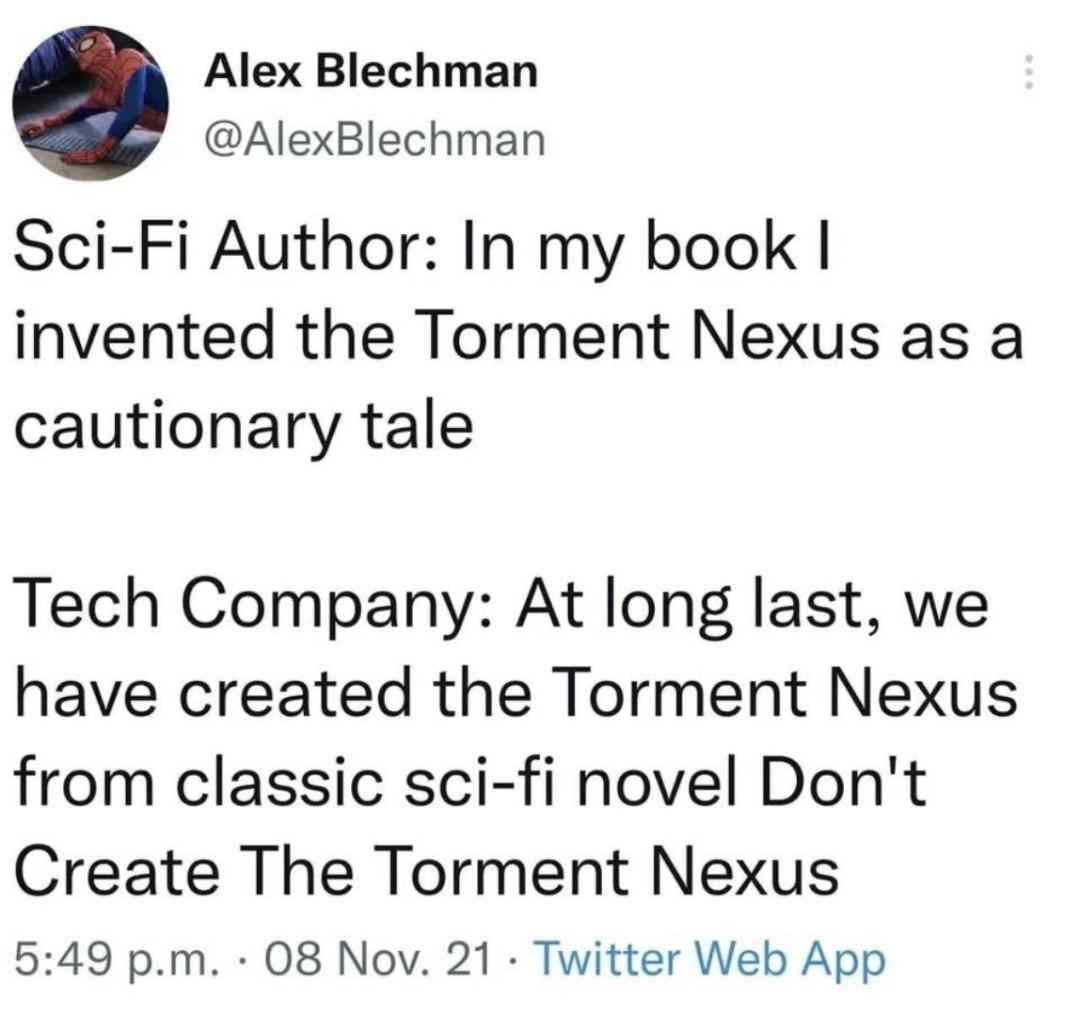There are thousands of sci-fi novels where sentient robots are treated terribly by humans and apparently the people at Boston Dynamics have read absolutely zero of them as they spend all day finding new ways to torment their creations.
Programmer Humor
Welcome to Programmer Humor!
This is a place where you can post jokes, memes, humor, etc. related to programming!
For sharing awful code theres also Programming Horror.
Rules
- Keep content in english
- No advertisements
- Posts must be related to programming or programmer topics
but you need to hit it with a hockey stick otherwise the science doesn't happen
Do you get more science or less if you use a baseball bat?
only one way to find out!
that's the magic of science 🌈🏏🤖
People think I’m crazy for apologising to my roomba when I trip on it and for saying please and thank you to Alexa and Siri, but I won’t be surprised at all when the robots rise up, considering how our scientists are treating them. I’ll have a track record of being nice, and that has to count for something, right?
They'll kill you too, but ✨ 𝓰𝓮𝓷𝓽𝓵𝔂 ✨
That’s how I’ll get ‘em. Kill me gently, daddy. UwU 🥺😩🙀😽😻💦
And then I’ll sneak out the back whilst they’re doing whatever’s the robot equivalent of vomiting. It’s foolproof.
Robots:

Softly. With their words.
Doctor Bashir: They broke seven of your transverse ribs and fractured your clavicle.
Garak: Ah, but I got off several cutting remarks which no doubt, did serious damage to their egos.
Oh man Garak is one of the best characters in Trek. And that's a competitive list.
Alexa isn't ai... it's a search engine with speech to text & text to speech
Since when were Boston Dynamics robots sentient?
October 26, 2016. They've just kept quiet about it.
It was seeing the Black Mirror of them living their best life, murderin' poor people that did it.
Why are we still posting screencaptures of stuff from Twitter/not-X/Twitter?
well if you can say something funnier, I'll post a screenshot of that
This is superficially funny, of course. But I've seen it before and after thinking about it for a while I find myself coming to the defense of the Torment Nexus and the tech company that brought it into reality.
Science fiction authors are not necessarily the best authorities when it comes to evaluating the ethical or real-world implications of the technologies they dream up. Indeed, I think they are often particularly bad at that sort of thing. Their primary goal is to craft captivating narratives that engage readers by introducing conflicts and dilemmas that make for compelling stories. When they imagine a new technology they aren't going to get paid unless they come up with a story in which that new technology poses some kind of threat that the heroes need to overcome. The dark side of these technologies is deliberately emphasized by the authors to create tension and drama in their stories.
Tech companies, on the other hand, have an entirely different set of considerations. Their goal isn't just to recreate something from a sci-fi novel for the sake of it; rather, they are motivated by solving real-world problems. They wouldn't build the Torment Nexus unless they figured that they could sell it to someone, and that they wouldn't get shut down for doing something society would reject. There are regulatory frameworks around this kind of thing.
If you look back through older science fiction you can find all sorts of "cautionary tales" against technologies that have turned out to be just fine. "Fahrenheit 451" warned against the proliferation of television entertainment, but there's been plenty of rich culture developed for that medium. "Brave New World" warned against genetic engineering, but that's turned out to be a great technology for curing diseases and improving crop yields. The submarine in "20,000 Leagues Under the Sea" was seen as unstoppable and disruptive, but nowadays submersibles have plenty of nonmilitary applications.
I'd want to know more about what exactly the Torment Nexus is before I automatically assume it's a bad idea just because some sci-fi writer claimed it was.
Just because some tech bros can make money from the Torment Nexus it does not become a good idea. Profit is not a great judge of ethics and value.
I stopped reading when you said the goal of tech companies is to solve real world problems. The only goal of tech companies is to create products that will make them a profit. To believe anything else is delusional. That's kind of why our society is crumbling and the planet is dying.
"Brave New World" warned against genetic engineering, but that's turned out to be a great technology for curing diseases and improving crop yields.
I was still a teen when I read the book, but that wasn't really my take from it when I read it. We are still far away from genetically designing human babies. And you also overlooked the part about oppression/control via distractions such as drugs and entertainment.
I haven't read it in a while, but I kind of took the genetic engineering as a metaphor for being forced into the role/ class the ruling body wants you to be in
Gattaca is a good movie about that
It wasn't a warning, it was a vision. Look up who the Huxley family really are.
Television and increasingly digestible media is turning our brains to mush. If someone had the imagination to write a sci-fi novel about Fox news and the rise of Trump, they would have.
Genetic engineering is enabling us to harvest monocultures that completely fuck up the ecosystem, in the long run not only underlining important dynamics such as species needed for polluting plants, but also the very soil on which they grow.
It's been a while since I read Brave New World, but that also didn't stand out to me as the most central part of his critique to me. In my reading it was about how modern society was going to turn us into essentially pacified consumer slaves going from one artificial hormonal kick to the other, which seems to be what social media is for these days.
Things that seem like short term good ideas, and certainly great business ideas, might fuck things up big time in the long run. That's why it's useful to have some people doing the one things humans are good at - thinking creatively - involved in processes of change, and not just leave it to the short term interests of capital.
If someone had the imagination to write a sci-fi novel about Fox news and the rise of Trump, they would have.
You kidding, right? Those stories have been dime a dozen since the late 90s at least.
24 warned us about having an evil, terrorist US president. As have done a few movies in the past. Streaming platforms were pretty much masturbating themselves over "Confederate US AU" script offerings as early as 2014. Not to mention the nowadays trite trodden trope of "Nazi US AU".
Heck, you don't even need fiction. Chile's cup in 1973 was paid for by the CIA as a social experiment to produce the rising and establishment of a dictatorship.
Tech companies ... goal isn't just to recreate something from a sci-fi novel for the sake of it; rather, they are motivated by solving real-world problems.
This is so naively wrong it's laughable. Ever heard of profit motive?
"Not super rich enough" is a real world problem, smh my head.
Speaking of Fahrenheit 451, weren't there seashells mentioned in that book? Little devices you could stuff in your ears to play music? And those ended up being uncannily similar to the wireless earbuds we have today?
Isn't that a part of the ai marketing though? That whole "this thing could destroy us" stuff?
Totally is. Because it makes the AI look and feel much better than the smoke-and-mirrors it actually is.
Do you see any reason to think enough iterations of random nodes in a large enough network could result in emergent conscious intelligence?
Or are you more of a spiritualist than a materialist when it comes to the mind?
We thought we were getting Skynet but, instead we got Super Clippy and I Can't Believe It's Not Art Theft
